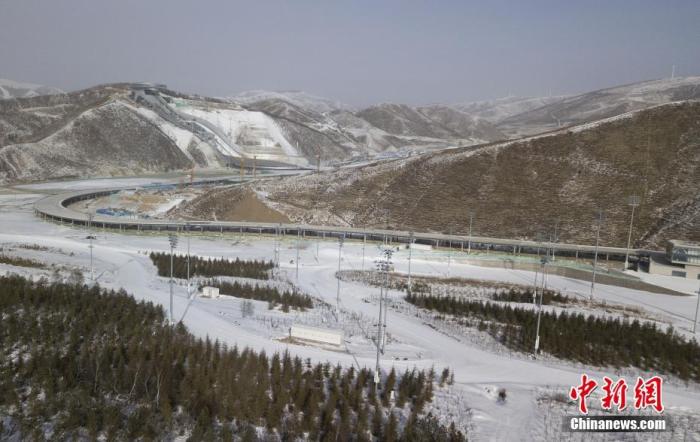(Observation of the two sessions) What will the Beijing Winter Olympics bring to China and the world?
China News Service, Beijing, March 9th. Title: What will the Beijing Winter Olympics bring to China and the world?
China News Agency reporter Xing Chong and Ma Xiuxiu
On February 4 next year, the Beijing Winter Olympics will kick off.
In China, the ice and snow sports continue to "heat up" and the preparations are proceeding in an orderly manner. Looking at the world, the epidemic in the century has not yet disappeared, and the International Olympic Movement has also been hit hard.
Representatives and committee members participating in the National Two Sessions this year told reporters from China News Agency that in this context, the Beijing Winter Olympics have special significance in China and the world.
Data map: "Bingdundun", the mascot of the 2022 Beijing Winter Olympics and "Xuerongrong" for the Paralympics.
Photo courtesy of Beijing Winter Olympics Organizing Committee
Look at China: Ice and Snow Sports "have a new look"
Taking advantage of the opportunity of hosting the Winter Olympics, "Ice and snow sports do not enter Shanhaiguan" has become a thing of the past.
Wang Yanxia, member of the National Committee of the Chinese People's Political Consultative Conference and deputy director of the Sports Department of the Beijing Winter Olympics Organizing Committee, is the first group of people to participate in the preparations for the Winter Olympics.
She said that in recent years, many provinces and cities have introduced policies to promote the popularization of ice and snow sports, and the education authorities have also done related work to promote ice and snow sports into campuses, and “have achieved very good results.”
You Lizeng, a representative of the National People's Congress and a teacher of Zhangjiakou No.1 Middle School, has paid attention to the cultivation of ice and snow talents in recent years.
Zhangjiakou is the main competition venue for the Beijing Winter Olympics snow project. In 2018, You Lizeng found in a survey that as the goal of "300 million people participating in ice and snow sports" gradually fell, professional personnel such as equipment maintenance and repair faced a large gap.
Zhang Jian, a member of the National Committee of the Chinese People's Political Consultative Conference and vice president of Beijing Sport University, also believes that the cultivation of ice and snow talents is a systematic project, which fills up the talent gap and stimulates the development of ice rinks, snow rinks and clubs.
"It can be said that in recent years, the entire industry, including training, competitions, and education, has made great progress."
Data map: Located at the National Cross-Country Skiing Center in Zhangjiakou, Hebei, where all 12 gold medals for the 2022 Winter Olympics cross-country skiing competition will be produced.
Image source: Visual China
In the past five years, the number of national standard skating venues has increased from 157 to 388, and the total number of ski resorts has increased from 568 to 770; more than 3,000 mass ice and snow activities are carried out in China each year, and the proportion of people participating in ice and snow sports has exceeded 15%.
The ice and snow industry is also undergoing structural reforms. In the past, high-end ice and snow equipment, which relied on imports, embarked on independent research and development, and advanced under the guidance of the "Technology Winter Olympics".
In the past few years, China's ice and snow sports have taken on a new look.
The deputies and committee members believe that behind this is China's unremitting pursuit of building a sports power and promoting the high-quality development of sports in the new era, which is in line with the Olympic mission of "making sports serve the harmonious development of mankind".
To the world: the promise remains unchanged and rebuild confidence
Since the outbreak, China has been steadily advancing the preparations for the Beijing Winter Olympics as planned, while strictly preventing and controlling the epidemic. The construction of all competition venues was completed ahead of schedule, and the Beijing-Zhangjiakou High-speed Railway and Beijing-Lishan Expressway opened to traffic.
When the preparations for the Beijing Winter Olympics were praised by the International Olympic Committee and other parties, noises of attempts to politicize sports also appeared from time to time.
Yang Yang, a member of the National Committee of the Chinese People's Political Consultative Conference with extensive experience in international sports, told reporters that this approach is selfish and hurts athletes and sports fans all over the world.
"I am also very happy to see that international sports organizations, such as the International Olympic Committee and international individual sports organizations, can reach a consensus and oppose such actions." Yang Yang said.
At a time when the world is hit by the epidemic and the international Olympic movement is filled with uncertainty, China's commitment to the Olympic bid has also promoted the stability and long-term development of global sports governance.
Yang Yang believes that under the epidemic, it is even more necessary for the international sports community to unite and help each other and work together to deal with it.
"The sportsmanship that refuses to admit defeat inspires people from all over the world to move forward courageously. I believe that the Beijing Winter Olympics can reshape the world's sports confidence and bring upward spiritual strength." (End)

